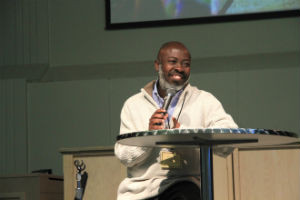Are we listening?
More than once, the room grew silent. The 50-or-so pastors, missions pastors and church leaders who had gathered were more used to resolving problems than hearing how they might have contributed to them. But listening was the core agenda here.
This gathering, called the Haiti Summit, took place in mid-May on the campus of the Evangelical Free Church of Hershey (Pa.). The purpose was to pull together the leaders of (mostly) EFCA churches that are committed to ministry in Haiti, and to invite Haitian church leaders to speak about whether the gospel is making a difference.

Photo: Laura-Jean Watson. One panel focused on international partnerships—how they have historically worked across the Evangelical Free Church and how they might work in Haiti. Mark Lewis (center), director of ReachGlobal Crisis Response, moderated the discussion.
“10,000 NGOs, the U.N., UNICEF, ACTED, Red Cross, Clinton Initiative, IRD, ActionAid, and over $12,000,000,000 in promised earthquake relief . . . more mission organizations per capita than anywhere else in the world—and yet Haiti was just cited as the poorest country in the world by an NBC News study. . . . So what gives?”
Thankful for a rich history of mission’s involvement in their country but cognizant of the often ineffectual results, Haitian church leaders asked the entire assembly to ponder: “What is the gospel that has been exported to Haiti?”
Historically, that gospel has been more Western than Haitian, more of our ideas than their needs, more of our church than “their” church. As a result, according to Dr. Jean Dorlus, chair of doctrine and worldview at the Federation of Protestant Churches in Haiti, “The Haitian church has not significantly impacted the Haitian worldview, even among most Christians.”
As proof, he pointed to the music sung in a typical Haitian church service: Instead of mirroring their indigenous culture and beat of calypso and steel drums, Sunday services are replete with traditional American (and European) hymns sung from an antiquated hymnal. He further noted that 30-40 percent of Haitians attend some kind of Protestant or Evangelical church during any given month; however, many of those very same people still visit the local voodoo priests when faced with life’s most difficult moments.
Stunned by the implications of those statements, participants turned to heart-searching small-group conversations with the visiting Haitian leaders—to better understand errors of the past and seek cultural guidance for the future.
Shaken but moving forward In more ways than one, the 2010 earthquake has shaken both the country and the church into asking serious, pivotal questions. While asking these questions, summit participants also wrestled through topics such as: “Haitian Culture vs. Biblical Worldview,” “Partnering to Empower,” “Micro Solutions to Macro Problems” and “Helping Without Hurting.”
Throughout the summit’s three days, the Haitian Church spoke. At one point, one of the conferees expressed, with tears in his eyes: “This isn’t about Haiti, this is about me, this is about us, and this is about how we can better listen to those whose country we are going to minister in.”

Photo: Laura-Jean Watson. Jean Dorlus provoked intense conversation with his observation: “The Haitian church has not significantly impacted the Haitian worldview.”
As the conference progressed, a simple yet profound theme emerged: The Haitian church wants to sit at the table as equals when decisions are made about them and their future and their country. Dr. Dorlus asked several poignant questions for the EFCA to consider as it moves forward with teams and projects and vision in the country of Haiti, including:
- As Haitians and Americans, can we be co-owners of everything that happens—equals at the table when visioning and planning? - As Haitians, can we ask that available resources are available to us too (and not merely dictated by one side)?
The Haitian church spoke—oh, how they spoke. In closing, Dr. Wadestrant Jean-Baptiste, dean of students at STEP seminary in Port-au-Prince, summed up well both the challenge and the opportunity:
“My prayer is that together, as one body of Christ, we would agree to go back and rethink how we do church, so that together we can address the very core issues that so affect Haiti today.”
With almost one voice, the seminar attendees asked the obvious next question: “What does that look like?” The answer, or answers, to that question brought everyone back to the very purpose of the summit. These same Haitians, together with some of the leaders and churches represented, committed to being part of a long-term Haiti Consortium—to work together on the questions, and possible answers, facing the Haitian people and the Haitian church.
But before any such answers emerge, the question remains: “Are we listening?”
Send a Response
Share your thoughts with the author.